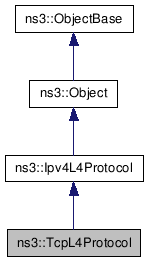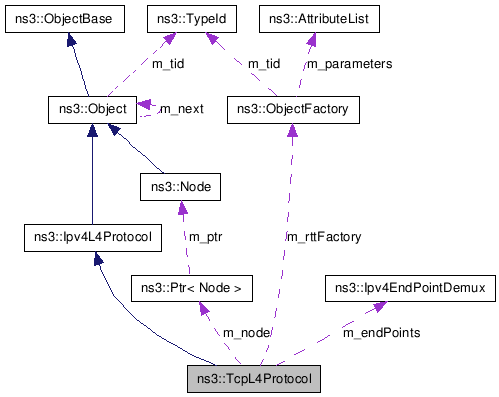ns3::TcpL4Protocol Class Reference
[Tcp]
A layer between the sockets interface and IP.
More...
#include <tcp-l4-protocol.h>


Public Member Functions | |
| TcpL4Protocol () | |
| Constructor. | |
| virtual int | GetProtocolNumber (void) const |
| Ptr< Socket > | CreateSocket (void) |
| void | Send (Ptr< Packet > packet, Ipv4Address saddr, Ipv4Address daddr, uint16_t sport, uint16_t dport) |
| Send a packet via TCP. | |
| virtual enum Ipv4L4Protocol::RxStatus | Receive (Ptr< Packet > p, Ipv4Address const &source, Ipv4Address const &destination, Ptr< Ipv4Interface > incomingInterface) |
| Recieve a packet up the protocol stack. | |
Static Public Member Functions | |
| static TypeId | GetTypeId (void) |
| This method returns the TypeId associated to ns3::TcpL4Protocol. | |
Protected Member Functions | |
| virtual void | DoDispose (void) |
| virtual void | NotifyNewAggregate () |
Detailed Description
A layer between the sockets interface and IP.This class allocates "endpoint" objects (ns3::Ipv4EndPoint) for TCP, and SHOULD checksum packets its receives from the socket layer going down the stack , but currently checksumming is disabled. It also recieves packets from IP, and forwards them up to the endpoints.
Member Function Documentation
- Returns:
- A smart Socket pointer to a TcpSocketImpl, allocated by this instance of the TCP protocol
| virtual void ns3::TcpL4Protocol::DoDispose | ( | void | ) | [protected, virtual] |
This method is called by Object::Dispose or by the object's destructor, whichever comes first.
Subclasses are expected to implement their real destruction code in an overriden version of this method and chain up to their parent's implementation once they are done. i.e., for simplicity, the destructor of every subclass should be empty and its content should be moved to the associated DoDispose method.
Reimplemented from ns3::Object.
| virtual int ns3::TcpL4Protocol::GetProtocolNumber | ( | void | ) | const [virtual] |
| static TypeId ns3::TcpL4Protocol::GetTypeId | ( | void | ) | [static] |
This method returns the TypeId associated to ns3::TcpL4Protocol.
Attributes defined for this type:
-
RttEstimatorFactory: How RttEstimator objects are created.
- Set with class: ObjectFactoryValue
- Underlying type: ObjectFactory
- Initial value: ns3::RttMeanDeviation[]
- Flags: construct write read
-
SocketList: The list of sockets associated to this protocol.
- Set with class: ns3::ObjectVectorValue
- Underlying type: ns3::Ptr< ns3::TcpSocketImpl >
- Flags: read
-
ProtocolNumber: The Ipv4 protocol number.
- Set with class: ns3::UintegerValue
- Underlying type: int32_t 18446744071562067968:2147483647
- Flags: read
Reimplemented from ns3::Ipv4L4Protocol.
| virtual void ns3::TcpL4Protocol::NotifyNewAggregate | ( | ) | [protected, virtual] |
This function is called by the AggregateObject on all the objects connected in the listed chain. This way the new object aggregated will be used if needed by the NotifyNewAggregate corresponding to each object connected in the listed chain. It should be implemented by objects needing an additional/special behavior when aggregated to another object.
Reimplemented from ns3::Object.
| virtual enum Ipv4L4Protocol::RxStatus ns3::TcpL4Protocol::Receive | ( | Ptr< Packet > | p, | |
| Ipv4Address const & | source, | |||
| Ipv4Address const & | destination, | |||
| Ptr< Ipv4Interface > | incomingInterface | |||
| ) | [virtual] |
Recieve a packet up the protocol stack.
- Parameters:
-
p The Packet to dump the contents into source The source's Ipv4Address destination The destinations Ipv4Address incomingInterface The Ipv4Interface it was received on
Implements ns3::Ipv4L4Protocol.
| void ns3::TcpL4Protocol::Send | ( | Ptr< Packet > | packet, | |
| Ipv4Address | saddr, | |||
| Ipv4Address | daddr, | |||
| uint16_t | sport, | |||
| uint16_t | dport | |||
| ) |
Send a packet via TCP.
- Parameters:
-
packet The packet to send saddr The source Ipv4Address daddr The destination Ipv4Address sport The source port number dport The destination port number
The documentation for this class was generated from the following files:
- src/internet-stack/tcp-l4-protocol.h
- doc/introspected-doxygen.h
 1.5.8
1.5.8